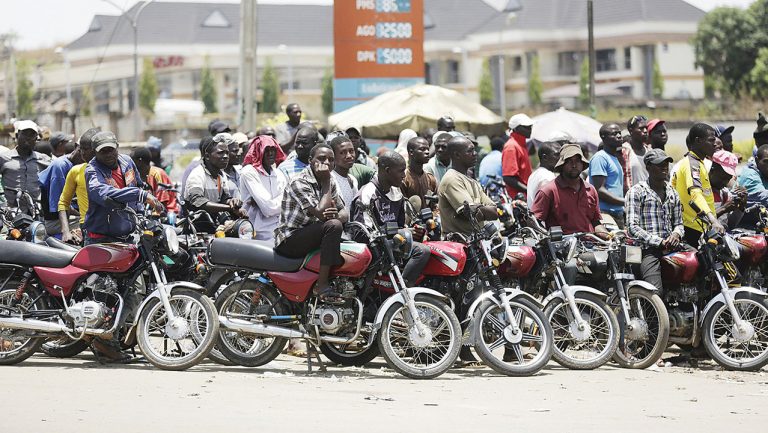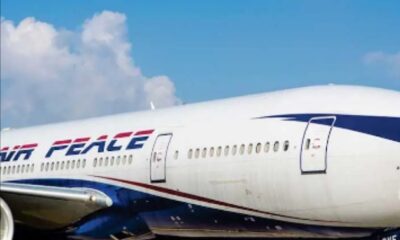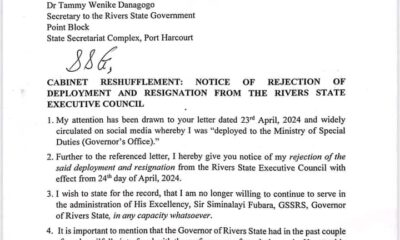News
Reps Probe Oil Spills At Three OMLs, Abandoned Oil Wells
Published
2 years agoon
By
Editor
The House of Representatives has resolved to investigate abandoned oil wells and spills from at least three Oil Mining Leases.
The House mandated its Committees on Petroleum Resources (Upstream) and Environment to “investigate the actual cause of the oil leaks at OML 18, OML 29 and OML 63, with a mandate to utilise experienced professionals to provide required insight, support and results.”
The committee is also to “determine the magnitude, scope, and effect of the leaks on affected hast communities; examine the scope and liability for required relief and compensation, including the status of provision of same; inquire the nature and details of the JV agreement between Aiteo and NNPC to determine veracity of ownership of percentage stake and financial obligations.
“Confirm the claim by Aiteo of engagement of a foreign company to stop the leak, the cost of doing so and the financial claim made by Aiteo to NAPIMS in this regard; and examine the nature and details of the JV agreement between Eroton and NNPC to determine completion of financial and other obligations for ownership.”
READ ALSO: Reps Approve Special Bank For Entrepreneurs, Small Businesses
Furthermore, the panel will “verify the numbers of idle and isolated wells currently existing on Aiteo, Eroton and other indigenous and international oil companies’ oil fields across Nigeria, the condition of these wells and the status of their management and abandonment in compliance with statutory provisions and international best practice.”
In addition, it will “explain the potential for significant residual deposits from identified idle and isolated wells across the country, the best methodology and strategy to achieve this additional revenue stream and the best international best practices being employed by other oil producing countries to achieve this.”
The committee is to report back to the House within two weeks for further legislative action.
These resolutions were sequel to the unanimous adoption of the motion moved by a member, Ibrahim Isiaka, titled ‘Urgent Need to Investigate Oil Spills at OML 18, OML 29, OML 63 and the Status of All Idle, Isolated and Abandoned Wells on Order to Avert Renewed Hostilities in the Niger Delta Region of the Country.’
Isiaka said he was raising the alarm over the confirmation by the National Oil Spill Detection Agency on June 25, 2022, of an ongoing oil leak for one week, from Cawthorne Channel Well 15, an idle and isolated well on Oil Mining Lease 18.
READ ALSO: Edo Govt Pledges Better Opportunities For Youths
He noted that it is a large oil bloc located towards the south of Port Harcourt, Rivers State, operated by Eroton Exploration and Production Limited, which has 45 per cent stake in a Joint Venture Agreement with the Nigerian National Petroleum Corporation (now Nigerian National Petroleum Company Limited) after Shell Petroleum Development Company of Nigeria Limited divested her interest in the bloc, in 2015.
The lawmaker added that the Corporate Communications Lead of Eroton reported an oil leak, which eventually resulted in a blowout of crude oil and gas into the environment on June 15, 2022, “whereas NOSDRA only reported the incident on June 25, 2022 – 10 days thereafter.
He stressed that the expected required Joint Investigation Visit by the relevant stakeholders – Eroton, Nigeria Upstream Petroleum Regulatory Commission (NRC), NNPC and the Rivers State Ministry of Environment – “has still not been conducted almost two weeks after the occurrence.”
Isiaka added, “No effort has been made to either stop or control the oil leak and this portends grave consequences to the ecosystem and the affected host communities.”
The lawmaker also noted that Aiteo Group, operator of another JV with NNPC, also reported an oil leak from its “idle and isolated” Santa Barbara oil well Head 1 on OML 29 in Nembe Local Government Area of Bayelsa State on November 5, 2021.
“The leak, which persisted for 32 days, was alleged to have spilled hundreds of thousands of barrels of crude into the Santa Barbara River and its tributaries, which traverse three kingdoms in Bayelsa State destroying sources of drinking water, fishing and farming ecosystem. Over six months later, the cause of the oil leak on OML 29 is still unknown,” he said.
According to the lawmaker, like OML 29, the unending phenomenon surrounding the current spill on OML 18 has not been conducted about two weeks after the occurrence. He added that the NAOC oil spill at OML 63 in Lasukugbena, Bayelsa State, lasted over one month, yet the root cause analysis has not been officially determined till date.
Isiaka said, “The House is also disturbed about recent statistics that show Nigeria has probably the worst oil spill record in the word with over 4,919 oil spills between 2015 and 2021, releasing over 400,000 barrels into the environment and ecosystem of affected communities.”
The lawmaker noted that there were allegations that “Aiteo, Eroton, and almost all indigenous and international oil companies operating in Nigeria have idle wells on most of their fields, which are not properly managed or abandoned and are likely to experience a blowout at any time, with potentially very grave consequences to the environment, health, safety, and socio-economic well being of millions of innocent Nigerian Citizens who inhabit the affected host communities.”
READ ALSO: JUST IN: FG Engages Lawyers For Ekweremadu
He said, “The House is curious about the postulation by industry professionals that in the light of current dwindling crude oil production output in Nigeria, up to 800,000 barrels of residual crude oil deposits can be obtained from idle and isolated wells across different oil fields in the country, with huge economic benefit to the country, similar to several oil-producing countries around the world who have consciously developed a strategy in this regard.”
You may like

By Lasisi Olagunju
One day, I will have the courage to ask the immaculate Ooni of Ife, Oba Enitan Ogunwusi, how he feels each time he travels on the horrible Ibadan-Ife road. Ben Okri, ‘The Famished Road’ storyteller, finds his own ‘road’ a torment – he says it “leads home and then away from it, without end.” Okri thinks the road a torment because he meets it “with too many signs and no direction.” The Ife-Ibadan road has signs, it has directions – and I find them very treacherously significant because they interlock fingers while road users lose life and limbs. The road has signs and directions to the very bowel of hell.
Olojo, the guardian divinity of the House of Oduduwa, is the famed owner of two machetes: with one machete, he prepares the field for the plants of tomorrow; with the other, he clears the road for prosperity (Ó fì’kan sán’ko/ Ó fì kan yè’nà). Those weapons must either now be blunt or lost. An Odu Ifa tells us something about Ile Ife and roads. It affirms that well-paved open roads start from Ile Ife. That affirmation today can only be treated on the operating theatre of irony. Could it be that truth has an expiry date and Ogbe’s truth of good, open roads in Ile Ife has expired? What we see today from the capital of Yorubaland (Ibadan) to the historical source of Yoruba people is the torment of a closed road that mocks the pathfinder-spirit of Oduduwa. The road does worse with its gaping craters and their threats of morphing into greater gullies. And it is a federal road.
Has the Ooni ever told the president that the worst road in the universe leads to his kingdom? Has he told the president that the N79.8 billion contract for the reconstruction of Ibadan-Ife-Ilesa road awarded in September, 2019 by his friend and villa mate, Muhammadu Buhari, has remained a contract for ghosts? Has he invited the president’s attention to the truth that since last year when he took over, the road has sunk even deeper in the mire of decrepitude? And, that even FERMA, a perennially rich agency that pretends giving palliatives on federal roads, has since seen the futility of stitching this rag? Or could it be that Kabiyesi does what our presidents since 1999 do – escaping road users’ pains by flying over our heads?
FROM THE AUTHOR: OPINION: Bobrisky’s Masque, Yahaya Bello’s Boa
The reigning culture here is rooted in the ragged soils of our toil. I admit that badness is not peculiar to the Ife-Ibadan-Ilesa road. It is a national affliction that can’t be cured because of the greed of doctors who treat sick roads with fake and expired drugs.
We work hard to build roads that wear out before they are inaugurated. We have the interminable construction mess called Lagos-Ibadan Expressway. When did construction start there? When will it end – if it will ever end? How much have we sunk there? And, is it not a shame that the road is ready already for corrective surgery even before its makers are done making it? If you are a woman, and you are pregnant and your doctor tells you dancing is a ‘safe and fun way to exercise’, do not dance to the break beats of that road. It is made for abortion.
Ben Okri says “all roads lead to death” and “some roads lead to things which can never be finished.” Is that why our federal government’s roads are forever ongoing, none is ever finished or completed? Federal government’s statistics says out of Nigeria’s national road network of 200,000 kilometers, 36,289 km belong to it. Now, you ask Abuja which of its other roads, apart from the one from the Villa to Abuja airport, is good? Ask them why almost all roads that wear federal tags suffer neglect, abandonment or crass abuse.
My NYSC journey to the far north 34 years ago was on the Ibadan-Ilorin-Jebba-Mokwa-Yauri road. It was an experience in pleasantness. It is, today, a monument to frustration, a shrine to demons that feed on losses -human and material. The Ibadan-Oyo-Ogbomoso part of that road is one major reason why Nigeria should not have a federal government – or have roads managed by the Federal Government. There should be a coroner’s inquest on why that road was killed and who killed it. Without the states, the vehicle of Nigeria would have long lost its chassis. States keep doing what heart surgeons do when arteries are found blocked. They create bypasses, byways. A brand new 78-kilometre Iseyin-Ogbomosho road has just been built by Seyi Makinde’s Oyo State to escape the Federal Government’s death trap along that axis. A commenter online wrote: “The road has helped us to link northern Nigeria without using the dangerous Oyo-Ilorin road that has consumed so many lives…” The Oyo-Ilorin road of death spoken of here belongs to the government in Abuja.
FROM THE AUTHOR: OPINION: For Yoruba Muslims And Pentecostals
Potholes jolt us to appreciate what bad roads represent in our lives. They tell us why the tyres of our country never last and why our rides are forever bumpy. Asking questions on why our roads are perennially bad is living the times of Ayi Kwei Armah’s ‘Two Thousand Seasons’: “A thousand seasons wasted wandering amazed along alien roads, another thousand spent finding paths to the living way.” Like Ouroboros, the self-tail-devourer, Nigeria’s ‘alien roads’ cyclically keep consuming the ‘living way.’
It is time to pound yam for the household, the idler among us goes for the heaviest pestle. This is better said in Yoruba: Òle bàá tì, ó gb’ódó nlá. There are abandoned federal roads everywhere which directly affect millions of Nigerians, but the government has moved the money to a 700km super coastal highway that will cost N15.6 trillion. The first phase is 47 kilometres, starting somewhere and ending nowhere, at a cost of N1.06 trillion. Should I just say that that N1 trillion will start and complete the reconstruction of decrepit Ibadan-Ife-Ilesa Road (224km), Ilorin to Bida (244.9km) and Shagamu to Benin (492km) if wisdom wills? Even at an inflated cost of N1 billion per kilometre, our husbands will achieve these and will even ‘collect change’. And Tinubu would have become very popular with it. But he wants a white elephant and has moved our money to purchase it.
White elephants are always expensive! Poet and journalist, Mathew Wills, in his ‘The Original White Elephant’ defines ‘white elephant’ as “something excessive that turns out to be valueless.” James A. Robinson and Ragnar Torvik in 2005 published an interesting article about the third world and deliberate bad investments – they titled their article: ‘White Elephants’. In that piece, they hold that politicians around here would always go for “white elephants” as against “socially efficient projects” because “the political benefits are large compared to the surplus generated by efficient projects.” That piece says much more than this. It is published in the Journal of Public Economics 89 (2005: 197-210). I think you should read it.
‘The Stolen White Elephant’ by Mark Twain is an interesting story on the cost of investing in big, expensive loss centres. It is the story of a fictional Kingdom of Siam. A reviewer says Siam is blessed with a “national appetite for fraud”. Another says it has officers of “pompous assumption of infallibility and ridiculous inappropriate procedures.” The “pointless” story is about an expensive search for a stolen white elephant, a further loss of hundreds of thousands of dollars in compensation and the eventual discovery of the rotting corpse of the supposedly stolen animal. The story ends with the duped narrator celebrating the man who duped him. It ends as the man pronounces himself “a ruined man and a wanderer in the earth.” In Studies in American Humour, Peter Messent (1995) does a lot of justice to it in his ‘Keeping Both Eyes Open.’ The whole story sounds Nigerian; what Fela called “expensive shit.” But I can argue that though we wander today, the past was a better experience.
FROM THE AUTHOR: OPINION: FG’s N90 Billion Hajj Politics
“How can you develop a country rapidly if you can’t get about it?” Sir Rex Niven, pre-independence Speaker of Northern Nigeria House of Assembly, asked that question 69 years ago in relation to the state of roads in Nigeria. On January 27, 1955, Riven was asked to brief the Royal African Society and the Royal Empire Society in London on “Recent Developments in Nigeria.” He gave a very detailed account of himself as a British participant in the affairs of a key component of the Nigerian federation. Sector by sector, he spoke about efforts and failures. He particularly spoke on roads which he described as “the most important of the great aspects of development.” He said as he was speaking (in 1955), Nigeria had over 30,000 miles of roads whereas in 1920, “she had hardly any at all.” Then he used Kabba (in present Kogi State) to illustrate what he was saying: “The first province I went to, the newly constituted Kabba Province, had exactly 4 miles of road…but when I left Kabba four years later, there were over 200 miles of road.” Thirteen years later, the same Niven, in retirement, told the Commonwealth section of the Royal African Society on 11 November, 1969 that Nigeria had 40,000 miles of quality roads. That figure was even in spite of the ongoing civil war. Now, you ask: Why are our golden years always in the past? The past was obviously better handled.
News
Lagos, Ondo, Taraba Top In Highest Okada Fares In March – NBS
Published
16 hours agoon
April 28, 2024By
Editor
A recent National Bureau of Statistics report shows Lagos, Ondo, and Taraba recorded the highest Okada (motorcycle) fares in March.
The data indicates substantial differences in transportation costs across various Nigerian states.
In March 2024, the average fare for Okada rides per trip in Nigeria rose by 2.15% compared to the same period last year, with fares reaching N472.16, up from N462.21 in March 2023.
This was contained in the most recent National Bureau of Statistics Transport Fare Watch report for March 2024, published on the agency’s website.
READ ALSO: Ondo 2024: lT Expert Emerges As SDP Candidate
However, fares in Lagos, Ondo, and Taraba states were notably above the national average for March 2024.
Lagos had the highest Okada fare at N850 per trip, with Ondo following at N725 and Taraba at N670, illustrating significant differences in transportation costs across regions.
Imo and Yobe states, with average Okada fares of N655 and N630 respectively for March 2024, ranked fourth and fifth among Nigerian states for the highest motorcycle journey costs per trip.
News
Trouble Looms As OAU Students Threaten Shut Down With FG Over Fuel Crisis
Published
16 hours agoon
April 28, 2024By
Editor
The students’ Union of Obafemi Awolowo University said on Sunday, said the challenges faced by students due to the sudden surge in the pump price of Premium Motor Spirit and the scarcity of the product have reached unprecedented levels.
The President of the union, Abbas Ojo, in a statement released on the campus in Ile-Ife, Osun State, and sent to The PUNCH, urged the Federal Government to immediately address the issues.
The union threatened to hit the streets in protest if the situation persisted.
Since the weekend, queues have surfaced across some filling stations in Ogun and Lagos states as some stations also remained shut.
The PMS also known as petrol has been selling between N700 and N800 at some filling stations. Some persons claim to buy the fuel at prices higher than N800 in Lagos and Ogun with the situation causing a hike in transport fares.
READ ALSO: Residents Displaced As Rainstorms Wreck Havoc In Edo Community
The Nigerian National Petroleum Company Limited had said some supply issues were responsible for the queues, urging customers to exercise patience.
A resident, Tomisin Bakare, who said he bought PMS from a filling station around the Lagos State University-Igando axis stated that he was shocked when the attendant said fuel was N700 per litre.
“This is after I had already spent over 50 minutes in the queue,” he added.
According to the students’s union president, the situation is not different in Osun, particularly around the campus environs where he noted bus drivers had increased fares.
“We, as students, can no longer endure the burden imposed by the government’s economic policies,” Ojo said.
READ ALSO: 86-year-old Injured As Fire Guts Building In Kwara
“Last year, when the decision to remove fuel subsidy became public knowledge, many, including students, harboured doubts about its impact on the nation’s economy. Even those who supported the removal of subsidies were skeptical, given the absence of concrete plans to alleviate the ensuing challenges,” he added.
President Bola Tinubu on May 29, 2023, during his swearing-in, announced the removal of fuel subsidy. Since then, Nigerians have been grappling with harsh economic realities coupled with the depreciation of the naira against the dollar.
“From soaring electricity tariffs to the skyrocketing cost of living, the adverse effects of the government’s capitalist policies have spared no one.
“Despite these challenges, students persist in their pursuit of education and academic endeavours. However, recent events such as fuel shortages and fluctuating prices have left students stranded both on campus and outside campus,” Ojo stressed, noting the students had been pushed to limits.
The union demanded immediate action from the FG to address the fuel scarcity, curb suspected hoarding of fuel, and regulate prices.
“We also demand that the government should revive the country’s refineries. The government must not test our will by not addressing these demands within the next 48 hours. Failure to do so, we shall hit the streets till the government addresses the fuel crisis which constitutes a threat to our academic pursuit,” the statement added.

OPINION: Sending Ooni Of Ife To Tinubu

Delta Police Kill Suspected Kidnapper, Rescue Victims, Arrest Armed Robber Cultist

Gunmen Assassinate Governor Aiyedatiwa’s Campaign Coordinator In Ondo
Trending

 News5 days ago
News5 days agoDrama! Supporters Of Yahaya Bello Perform Rituals to Prevent His Arrest By EFCC [Video]

 Headline4 days ago
Headline4 days agoSaudi Arabia Opens First Alcohol Store, Nigerian Muslims React

 News4 days ago
News4 days agoEdo: FRSC Threatens Sanction On Truck Drivers Loading Goods, Passengers Together

 Metro5 days ago
Metro5 days agoEdo Cultists Kill Rival In Daughter’s Presence, Abandon Getaway Car

 Headline4 days ago
Headline4 days agoVIDEO: Meet Nigerian Pastor Who Predicted World Will End April 25

 News4 days ago
News4 days ago243 Passengers Cheat Death As Air Peace Plane Makes Emergency Landing At Lagos Airport

 Metro4 days ago
Metro4 days agoJUST IN: Four-year-old Boy Dies In Abuja School, Parents Suspect Foul Play

 Metro4 days ago
Metro4 days agoJUST IN: Protesters Storm APC Secretariat, Demand Ganduje’s Resignation

 News5 days ago
News5 days agoJUST IN: Wike’s Loyalist Rejects Fubara’s Redeployment, Resigns As Rivers Commissioner

 News5 days ago
News5 days agoPSR: PIND Foundation Seeks Feedback from Niger Delta Residents, Stakeholders


























